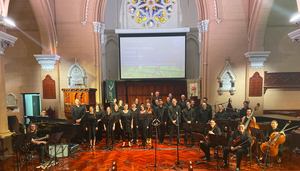Review: CONSIDERING MATTHEW SHEPARD at Flinders Street Pilgrim Uniting Church
 Reviewed by Ewart Shaw, Friday 15th and 16th November 2019.
Reviewed by Ewart Shaw, Friday 15th and 16th November 2019.
For most people, the word 'passion' describes an intense emotion or commitment to an ideal or an occupation. In musical terms, a 'Passion' is a musical representation of the Crucifixion of Jesus, and the surrounding events; the torture, the suffering, and the aftermath. The most famous of these are by Johann Sebastian Bach, the Passion according to St. Matthew, and the Passion according to St. John.
Craig Hella Johnson has taken these works as his inspiration for Considering Matthew Shepard, a contemporary oratorio, presented in three gripping performances by Jesse Budel and Company for Feast 2019. It is a heartbreakingly beautiful work receiving its Australian premiere during the Feast Festival.
Twenty-one years ago, Matthew Shepard, a gay college student, was kidnapped, beaten and left to die by two young men, Aaron McKinney and Russell Henderson. After eighteen hours, tied to a fence in a paddock, he was found, but died without regaining consciousness. Somehow this, among so many other murders of homosexuals, caught the imagination and became an icon. So quickly potent was it that his funeral, a week later, was picketed by Fred Phelps and members of his viciously homophobic Westboro Baptist church.
There are specific, though few, direct Bach references in the score. The opening seconds have the most famous of the Bach Preludes played on piano by Paul Sinkinson, and later the word 'Kreuziger' (crucify) is chanted by the choir.
Where Bach has a narration by a solo tenor, here words are spoken. Bach's arias are replaced by songs and ensembles in a variety of popular music genres. The choruses are mirrored by some of the most impressive, complex and emotionally rich music for vocal ensemble written in the 21st century.
That Budel's hand-picked choir of twenty voices learned this mighty score across four, obviously, very intense rehearsals is just incredible. Every vocal line was clear and confident. That confidence was also apparent in the way each speaker could move easily from their place in the choir to the microphone, each confident move of the singers across and off the performing platform as they moved into to aisles of Pilgrim Church to create a surrounding musical ambiance.
The prologue and epilogue place the story clearly within the environment of the State of Wyoming, a state of Cattle, Horses, Grass and Sky, a paradise of innocence in the American West. There's a brief and sweet cowboy moment delivered by John Khammash which made me think of the opening of My Own Private Idaho. At one point, the men sing plainchant tying the music back more than a thousand years. Elsewhere, there's country, and western, love ballads but, above all, magnificent choral writing.
One striking moment among so many is the eruption into the choral sound of a shattering electric guitar solo from Caspar Hawksley which heads into a surprising Motown moment when Riana Chakravarti, with a backing trio, sings Keep it Away from Me (The Wound of Love.). Bonnie Aue's bass playing here really shines, but then everyone does.
Elsewhere, there's the poignant singing of Oliver Vickers, as Matthew's young self, in Ordinary Boy, and the magisterial performance of bass James Scott, as the fence to which Matthew had been tied, singing with great power about the way the fence, like the cross of Jesus, had held him like a mother. Every solo, every small ensemble, was delivered with love and intense communicative musicality and sincerity.
The emotional core of the work is contained in words spoken by Matthew's father, Dennis, in his statement to the court. Those final words, heartbreaking, simple, state that while there were no people by as his son died, he was surrounded by his old friends, moon and stars, the sun, the scent of sagebrush and his saviour, Jesus. Delivered simply by Mark Roberts, they were the message of consolation and connection to an age-old faith.
It's easy to throw around words like 'tragedy', 'masterpiece', 'success', and 'triumph', but what marks this out as such an amazing work, and an equally astounding performance, is the humility and joy that, like the work of Bach, has flourished from sacrifice.
Jesse Budel brought this work together. His confident direction of his forces, communicative gestures, and command were impressive and easily legible. He should be encouraged and supported to bring his team back together and repeat this significant work outside the context of the Feast Festival.
The two performances I attended had the audience on their feet as the final moments died away. That's probably never happened in Pilgrim Church before. It was an ovation completely well deserved.
Reader Reviews

Videos

